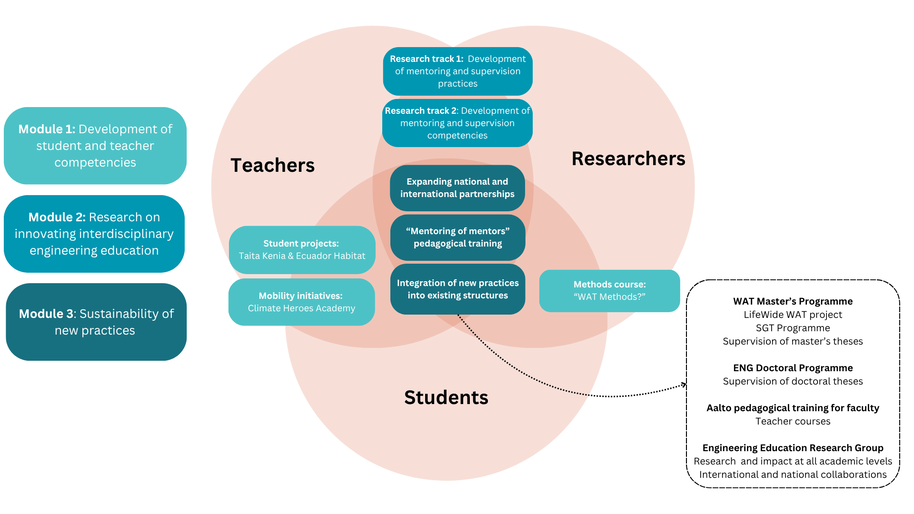Engineering Education Research
A research group focusing on engineering education research across Aalto

Announced by Aalto University's communications in June, the Aalto InnoWAT project is focused on refining educational approaches and addressing global challenges in water and environmental engineering through innovative cross-border collaborations.At the heart of the project are two new study projects implemented through Aalto’s Sustainable Global Technologies (SGT) Studio course, which has provided students with real-world, interdisciplinary, and multicultural learning experiences for nearly 20 years. The study projects include 1) “Taita Kenya”, developed in partnership with the Taita Research Station of University of Helsinki, and 2) “NexusCityLab Ecuador”, a collaboration with the Technical University of Munich (TUM), both proposing approaches to issues in the water, environment, and energy sectors.

Students participating in these study projects will gather data and apply research methodologies taught in the newly introduced "WAT Methods" course. This course caters for both master's and doctoral students, addressing the needs of novices in the research field.
Students participating in these projects will also benefit from the newly introduced WAT Methods course, which supports both master’s and doctoral students in learning research design, data collection and analytical approaches. The course also offers doctoral and postdoctoral researchers the opportunity to co-teach and gain pedagogical experience, which strengthens both research and teaching skills across career stages.
Alongside these developments, the InnoWAT project will also launch a pilot mentor training initiative as part of Aalto’s pedagogical offerings. In problem-based learning courses, student teams are supported by mentors who guide them through project work, field activities and collaboration with partner organisations. Mentors can include practitioners as well as early-career researchers from master’s to postdoctoral level. Through InnoWAT, mentors will receive structured pedagogical support and practical guidance experience while working with student teams. The initiative addresses a recognised gap in mentor preparation in engineering education and helps build a stronger community of practice among those supporting student learning.
To deepen global collaboration and climate-focused expertise, students and mentors will additionally participate in the Climate Heroes Academy mobility programme of the Technical University of Munich. The programme brings together young researchers working on climate-related challenges and promotes cross-institutional development of teaching and supervision practices.
All teaching and learning activities in InnoWAT are supported by research led by Aalto University’s Engineering Education Research Group. A doctoral researcher and a postdoctoral researcher will examine problem-based and mentor-supported learning in interdisciplinary and international settings. Their work explores how these approaches shape learning, boundary-crossing collaboration, and professional growth among students, teachers and partner organisations.
The research combines interviews, surveys and participatory methods to gather insights from new and ongoing educational activities. The findings contribute to Aalto University’s strategic goal of integrating sustainability across all education and demonstrate how collaborative, practice-embedded teaching models can support more holistic engineering competences.
By integrating pedagogical development with rigorous inquiry, InnoWAT contributes to the growing knowledge base on sustainability-oriented engineering education. The insights generated will inform future curriculum design at Aalto and beyond.
A research group focusing on engineering education research across Aalto

Programme pages for students

The InnoWAT project strengthens education in the water sector



